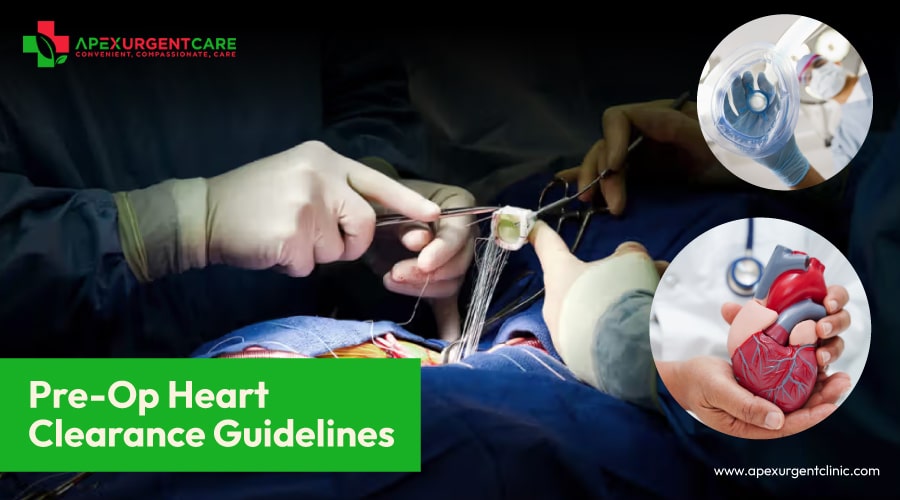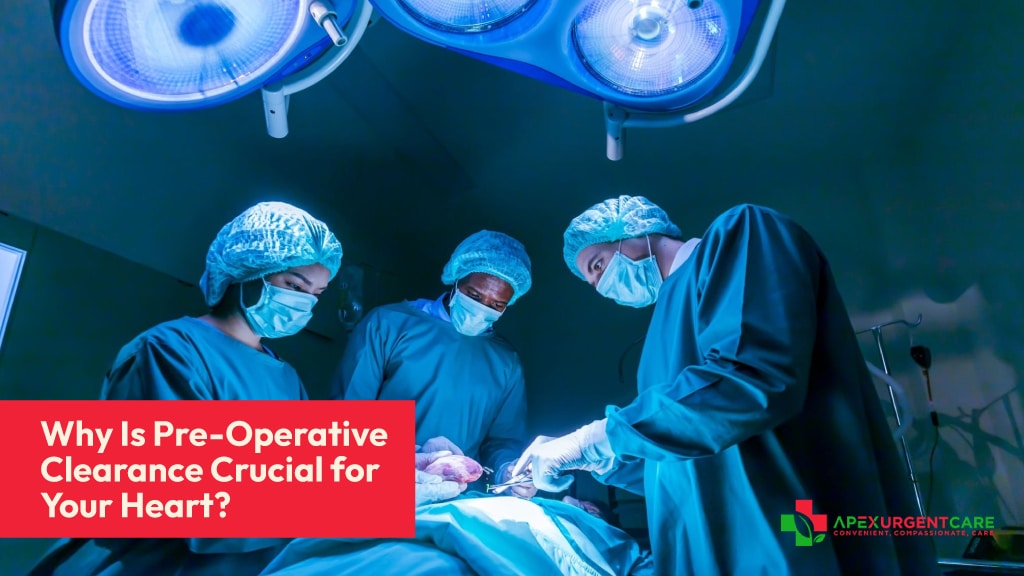
Are you or a loved one preparing for heart surgery? You are wondering, What tests will I need? Should I stop my medications? Why do I even need a pre-op clearance when I already see a cardiologist?
In September 2024, leading cardiovascular societies like the ACC, AHA, and others dropped updated guidelines that change how we prepare patients for non-cardiac surgeries when they have a history of heart disease or risk factors. If you are in Houston, our doctor at Apex MD Clinic is informed about these smarter and safer options.
Why Is Pre-Operative Clearance Crucial for Your Heart?

Think of pre-op clearance as your surgery’s rehearsal. It helps the healthcare team understand your current heart health, reduce surgical risks, and plan your care. If you have high blood pressure, diabetes, atrial fibrillation, or a prior heart attack, you can’t skip this step.
Here’s the exciting shift: Pre- op clearance is not about running every test; it is about smarter choices that improve outcomes.
Should Everyone Get an EKG or Stress Test Before Surgery?
This is where the 2024 guidelines made a change.
You might think an EKG or stress test is just routine, but these tests are only recommended when clinically necessary. In other words, if you have no symptoms and your risk is low, you might not need them at all.
Why the change? Unnecessary tests delay your surgery and lead to avoidable anxiety or false alarms. Unless you have chest pain, shortness of breath, or a known cardiac condition that needs review, your Houston doctor may skip it.
What About Medications? Can I Stay on Everything?
Great question. Certain medications, especially SGLT-2 inhibitors (commonly used for diabetes and heart failure), should be stopped 3 to 4 days before surgery. Because they increase the risk of a dangerous condition called euglycemic ketoacidosis under anesthesia. And no one wants that.
Not sure what you are taking or what category your meds fall under? That is why your pre-op visit is essential. The team reviews everything—blood thinners, beta-blockers, statins, and others to make sure you are on what helps, not what could harm.
Is My Risk High or Low? What Happens Next?
Pre-operative cardiovascular risk stratification is a fancy way of saying, Let’s figure out how your heart might handle the surgery. We assess this based on:
Your age
Your symptoms (or lack thereof)
Your past heart history
The type of surgery you are getting
From there, you might need a heart echo, updated labs, or a cardiologist’s sign-off on your case as complex.
What Can You Expect at Apex MD Clinic?
We answer your questions because surgery can be scary, but information helps you take control. When you come in for a pre-op heart clearance at Apex MD Clinic in Houston, here is what happens:
- We review your medical and surgical history.
- We take your vitals and listen to your heart.
- We order only the tests you need—no more, no less.
- We help you adjust or pause medications safely.
- We coordinate with your surgeon and cardiologist if needed.
Surgery Prep Is Smart
Pre-operative clearance has evolved. It is not about checking boxes anymore; it is about checking you. Thanks to the new 2024 guidelines, we are clearing patients for surgery safely, with less fuss and fewer tests.
If you have an upcoming procedure and a heart condition, see our Houston doctor at Apex MD Clinic. We will help you get surgery-ready without the confusion. Your heart matters. Let’s prep it properly. Top of Form
Bottom of Form

